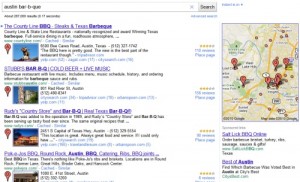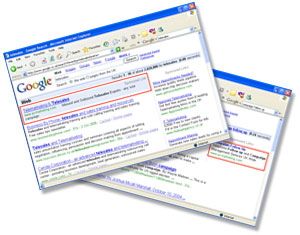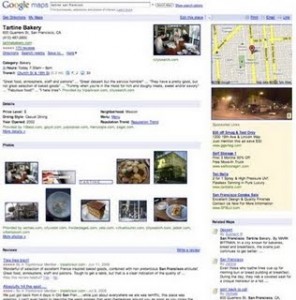Organic Search Results for Travel On The Decline?
According to most encyclopedia definitions, organic searches are natural listings/results from a search-engine spider crawling a Web site. The process begins when a keyword is used in a search engine. There is no monetization (pay for these listings. It’s simply the most accurate results according to the work of the search engine. The key word here is “relevant.”
We have to accurately define “organic search results” and determine why they are important (if they still are). This will let us move on to more in-depth information about organic search results for travel. In addition, we will be able to comprehend why some observers of the Web world are writing the “obituary” for these searches on Google.
The Opposite
 raIn recent weeks the concern has been the “death” of organic search results for travel on Google. In other words, there is concern that the majority of results for the travel industry will be paid advertising. The question is: Will you be able to come up with truly organic search results when you seek travel information?
raIn recent weeks the concern has been the “death” of organic search results for travel on Google. In other words, there is concern that the majority of results for the travel industry will be paid advertising. The question is: Will you be able to come up with truly organic search results when you seek travel information?
Processes such as pay-per-click advertising would qualify as non-organic in this discussion. Major search engines such as Google and Yahoo, for example, use combinations of advertising and search results on their pages. Ads are designed so they look like search results, though background color usually sets them apart. Many non-technical users/end users simply don’t recognize these paid listings for what they are.
Will the big spenders with Google benefit from unique technical assistance so that they achieve better “organic” search engine placement?
As We Know It
 In 2010, Wired magazine carried an article that basically proclaimed the death of the Internet as we know it. The theory seems to be that we will focus on applications (apps) rather than on the search process. It seems that we are moving into a world in which final results are available, with most of the work already completed for you. This is part of the Bing story and may be a factor in the Google changes as well.
In 2010, Wired magazine carried an article that basically proclaimed the death of the Internet as we know it. The theory seems to be that we will focus on applications (apps) rather than on the search process. It seems that we are moving into a world in which final results are available, with most of the work already completed for you. This is part of the Bing story and may be a factor in the Google changes as well.
Some observers have proposed that the idea of the big-money advertisers getting the preferential placements is just good business. The big spenders have account representatives at the Google offices. Scott Buresh wrote for www.searchengineguide.com, “I am willing to bet that this perk was not Google’s idea. Rather, it almost certainly stemmed from the sense of entitlement that those spending large sums on paid search felt and the fact that technical help with their organic search engine placement is what they demanded.”
He asks whether Google can continue to work with its “Don’t Be Evil” philosophy. Will this be replaced by a philosophy that focuses on keeping shareholders happy?
Upgrades and Improvements?
 The concern about the death of organic search results for travel grew from an announcement by Google about upgrades to the search process. When search results are displayed the user will see a much different design. Two major items that will be obvious to regular users will be maps on the right side of the screen and additional content that is not actually part of results listings.
The concern about the death of organic search results for travel grew from an announcement by Google about upgrades to the search process. When search results are displayed the user will see a much different design. Two major items that will be obvious to regular users will be maps on the right side of the screen and additional content that is not actually part of results listings.
The problem seems to be that this will create confusion rather than being an improvement. In some cases the organic search results that most Google users are familiar with end up with borders that set them off, though this section doesn’t have the colored background that paid listings have.
Another user, from another part of the world, gets similar results but the organic results are not set off by a border and appear as they generally do with organic searches. Google has already written about this change and insists that what they call Universal Search results are definitely organic, not paid for or click-based.
Kevin May wrote, on www.tnooz.com, that an experienced analyst for a digital-marketing agency expressed concerns about the design.
“This forces brands to consider Google as a content destination as well as a search provider. Google Places may well be significant in this. It’s not surprising Google is doing this, it’s long been predicted Google would expand Universal Search into a polymorphic vertical search.”
Content Destination
For some who have long supported the openness and freedom of the Internet and the World Wide Web the idea of the major search engine morphing into a content destination is troublesome, at best. Of course, Google has expanded and changed through the years, offering products and services that many find useful, even essential, in the online world.
It seems that some users are beginning to question why Google can’t keep its search-engine service separate from its revenue stream. While this hasn’t been the case for years, it might seem that the limited paid-for results of the past are becoming just that – a thing of the past.
We all know that page design is one of at least three major factors in successful online marketing. Design works hand-in-hand with quality content and a call to action. If Google search results are becoming content destinations, at least in the travel arena, how long will it be before there is an overt call to action for the biggest advertisers?
In the opinion of some long-standing Web watchers, the design, placement and percentage of page coverage devoted to larger revenue streams is already a covert call to action. If the search results for travel are no longer truly organic can other commercial sectors be far behind?







